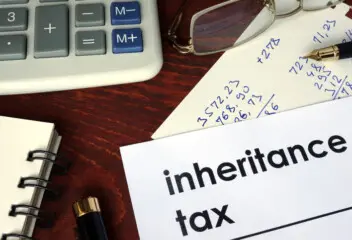8 ways to avoid inheritance tax
Rising property prices means more families are drawn into the inheritance tax net. But with careful planning, you can reduce the portion of your estate that is lost in tax – or even avoid inheritance tax altogether. This guide shows you the popular and fully legitimate methods for reducing tax and maximising your loved ones’ inheritance.
When you die, if your estate is above a certain threshold, inheritance tax may be charged. But there are steps you can take to reduce the amount of inheritance tax that’s charged and you may be able to avoid inheritance tax altogether.
When it comes to how to avoid inheritance tax, here are some popular options.
1. Make gifts
You can gradually reduce the size of your taxable estate by making gifts during your lifetime. The rules surrounding these are complex, however, and not all gifts will reduce inheritance tax in all circumstances.
You can gift up to £3,000 in a single tax year, and carry forward unused exemptions from the previous year. This means you can gift up to £6,000 (or £12,000 as a married couple) every two years and your beneficiaries won’t have to pay inheritance tax on it.
Wedding gifts also carry inheritance tax exemptions: parents can give £5,000, grandparents £2,500 and anyone else up to £1,000. You can also make smaller gifts (worth up to £250) to any individual. You can do this for as many individuals as you like – but only one per person.
Larger gifts are classed as potential exempt transfers (PETs). If you die seven or more years after making them, then no inheritance tax is payable. However, if you die sooner, inheritance tax may be payable (the amount can be reduced if you die between 3 and 7 years after making the gift). Keep records of your gifts to save your family from disputes later on.
For advice on inheritance tax planning, our partners at Unbiased can match you with the right financial adviser for your needs
Find an IFA
You don’t have to make life’s big financial decisions alone. Get the right IFA for you today with our partners at Unbiased.
Find an IFA
2. Leave your estate to your spouse or civil partner
In the 2025/2026 tax year, everyone has a tax-free inheritance tax allowance of £325,000, known as the nil-rate band. If your estate is worth less than £325,000, it falls entirely within this nil-rate band and no Inheritance Tax is payable. If it exceeds £325,000, the portion above that threshold is usually taxed at 40%.
There is no Inheritance Tax to pay on anything you leave to your spouse or civil partner – they are exempt from the tax.
In addition, if your spouse or civil partner dies before you, any unused portion of their nil-rate band can be transferred to you. This means your total Inheritance Tax threshold could increase to up to £650,000 (i.e. 2x £325,000).
However, if the first partner to die used up some of their nil-rate band (for example, by leaving assets to children or others), only the unused portion can be transferred. Importantly, what is transferred is a percentage of the unused allowance, not a fixed amount – and this same percentage will be applied to the nil-rate band in force when the surviving partner dies.
3. Giving to charity
If you’re looking at how to avoid inheritance tax, gifts to charities and political parties can be free from inheritance tax. Furthermore, if you leave at least 10% of your assets in your will to charity, you can reduce the rate of inheritance tax on everything else to 36%. So, it could pay to be generous!
4. Passing your home to your child or grandchild
When it comes to how to avoid inheritance tax on property in the UK, if you are bequeathing your home to your children or grandchildren (including adopted, fostered and step-children), then there is more protection from inheritance tax in the form of the ‘main residence nil-rate band’. This is currently £175,000 per person and applies if your estate is worth less than £2 million.
This means someone who dies could pass on assets worth up to £500,000 tax-free, if this included their residence passing to their descendants. Furthermore (because this band too is transferable), it means a couple could pass on up to £1 million if the same conditions were met.
Remember that only direct descendants qualify for the main residence nil-rate band. Other relatives (e.g. nieces and nephews) or friends do not. Also, if you own more than one property, your estate’s executor can decide which property to use against the residence nil-band rate allowance.
See our guide to Inheritance tax on property for more advice on how to avoid inheritance tax on property.
For more advice on inheritance tax, find a tax adviser specialising in estate planning through our partners at Unbiased.
5. Taking out a retirement interest-only mortgage
If you have a large estate, you may be able to avoid inheritance tax by taking out a ‘retirement interest-only mortgage‘ to pass on some early inheritance to family members. These mortgages involve releasing equity from your house and paying the interest on the loan each month. The capital doesn’t need to be repaid until you die or go into long-term care.
By reducing the size of your estate in advance it also means there may be a smaller inheritance tax bill when you die, and you may be able to avoid inheritance tax completely, although this will depend on your circumstances and we advise you should consult an independent financial adviser.
6. Avoid inheritance tax by using trusts
You can put assets into a trust for someone, to take them outside your estate and so reduce the inheritance payable on them or avoid inheritance tax completely. The rules surrounding trusts are very complex, however, so you should consult an independent financial adviser first.
Find an IFA
You don’t have to make life’s big financial decisions alone. Get the right IFA for you today with our partners at Unbiased.
Find an IFA
7. Spend it!
If you’re looking at ways to avoid inheritance tax, then the chances are you have a fairly sizeable estate to pass on. While it’s understandable that you want to look after your children and grandchildren, you have worked hard to build up your assets so you should enjoy the benefit in your retirement.
8. Make a will
When we’re looking at how to avoid inheritance tax, making a will is vital. It’s one of the simplest and easiest ways to make sure your money goes to the people you want, for the reasons you choose. Making a will also allows you to choose how your assets will be managed when you die, letting you plan for and reduce your inheritance tax bill.
When do I pay inheritance tax?
We’ve looked at how to avoid inheritance tax, but what happens if you still need to pay it? Inheritance tax must be paid within 6 months of the person’s death and is usually arranged by the executor. This is not long and catches many people out. Probate (the process of sorting out a persons estate after their death) usually takes at least this long and often longer. The assets may not even be released from the estate by the time the tax falls due. Furthermore, if the main asset is a property (as it usually is), then this may have to be sold to pay the tax. Property sales, alone, can take many months. See our guide to selling a probate property.
HMRC will start charging interest once the six months is up. One option is to pay a portion of the tax within that time, even if the estate hasn’t been fully valued. See Life insurance below for another solution to this problem.
For more information on the probate process and when and how inheritance tax is paid see our guide Probate Explained.
Avoid inheritance tax fees with life insurance
If you expect your family will need to pay inheritance tax on your estate when you die, you may consider taking out a life insurance policy to pay some or all of the inheritance tax due.
It can be particularly useful if the tax needs to be paid before your estate can be distributed. You can take out a life insurance policy specifically designed to pay the inheritance tax bill. So that your beneficiaries can avoid inheritance tax fees having to be paid in a hurry.
But most life insurance policies will count as part of the estate unless your policy is written ‘in trust’. This doesn’t cost anything extra and you can do it when taking out your policy.
Writing life insurance in trust essentially means that the pay out is paid to your beneficiaries and not to your legal estate. This means it won’t be taken into account when inheritance tax is calculated. For more information, read our guide Do I need life insurance?
Compare life insurance quotes, buy online and put your policy into trust using the service provided by LifeSearch.
Get Life Insurance Quotes
Get fee-free advice and quotes from leading UK insurers
Get advice & quotes
Do you pay inheritance tax on pensions?
Under the current system, inherited pensions are not counted for inheritance tax purposes. However, in the October 2024 Budget, the Chancellor announced that they will be included from April 2027.
Frequently asked questions
What is the 7 year inheritance tax loophole?
No inheritance tax is due on gifts you give if you live for 7 years after giving them – unless the gift is part of a trust. This is known as the 7 year rule. Gifts that were given within the 3 years before your death are taxed at 40%. However, gifts given between 3 to 7 years before the donor dies are taxed on a sliding scale known as ‘taper relief’. Find out more in our guide in Inheritance tax on property.
How much can you inherit from your parents without paying taxes UK?
For a married couple who combine their allowances and leave their home to children or grandchildren, they can pass on estates of up to £1million free of inheritance tax. Get more detailed information on this in our guide in Inheritance tax on property
How can I legally avoid inheritance tax?
There are a number of ways to avoid inheritance tax including making gifts within your lifetime, giving to charity and using extra property allowances by passing a property to your children or grandchildren. Find out more in our guide in Inheritance tax on property
Do I pay stamp duty on an inherited property?
No. Stamp duty is not levied on inherited properties. But if the property you inherit is shared with other beneficiaries and one of you buys out the others then stamp duty could be due. Find out more in our guide to inheriting a house.
What is the mansion tax?
A mansion tax, officially called the High Value Council Tax Surcharge, will be introduced on homes worth over £2 million. The mansion tax will apply to homeowners with properties valued at more than £2 million in 2026, and be collected alongside council tax from April 2028.
Related Reads
Show More Articles+
Show Fewer Articles−
Top Owning Guides
Show More Articles+
Show Fewer Articles−
How this site works
HomeOwners Alliance Ltd is registered in England, company number 07861605. Information provided on HomeOwners
Alliance is not intended as a recommendation or financial advice.
Mortgage service provided by London & Country Mortgages (L&C), Unit 26 (2.06), Newark Works, 2 Foundry Lane, Bath
BA2 3GZ, authorised and regulated by the Financial Conduct Authority (FRN: 143002). The FCA does not regulate
most Buy to Let mortgages. Your home or property may be repossessed if you do not keep up repayments on your
mortgage.
HomeOwners Alliance Ltd is an Introducer Appointed Representative (IAR) of LifeSearch Limited, an Appointed
Representative of LifeSearch Partners Ltd, authorised and regulated by the Financial Conduct Authority. (FRN:
656479).
Independent Financial Adviser service is provided by Unbiased, who match you to a fully regulated, independent
financial adviser, with no charge to you for the referral.
Bridging Loan and specialist lending service provided by Chartwell Funding Limited, registered office 5 Badminton Court, Station Road, Yate, Bristol, BS37 5HZ, authorised and regulated by the Financial Conduct Authority (FRN: 458223). Your property may be repossessed if you do not keep up repayments on a mortgage or any debt secured on it.






